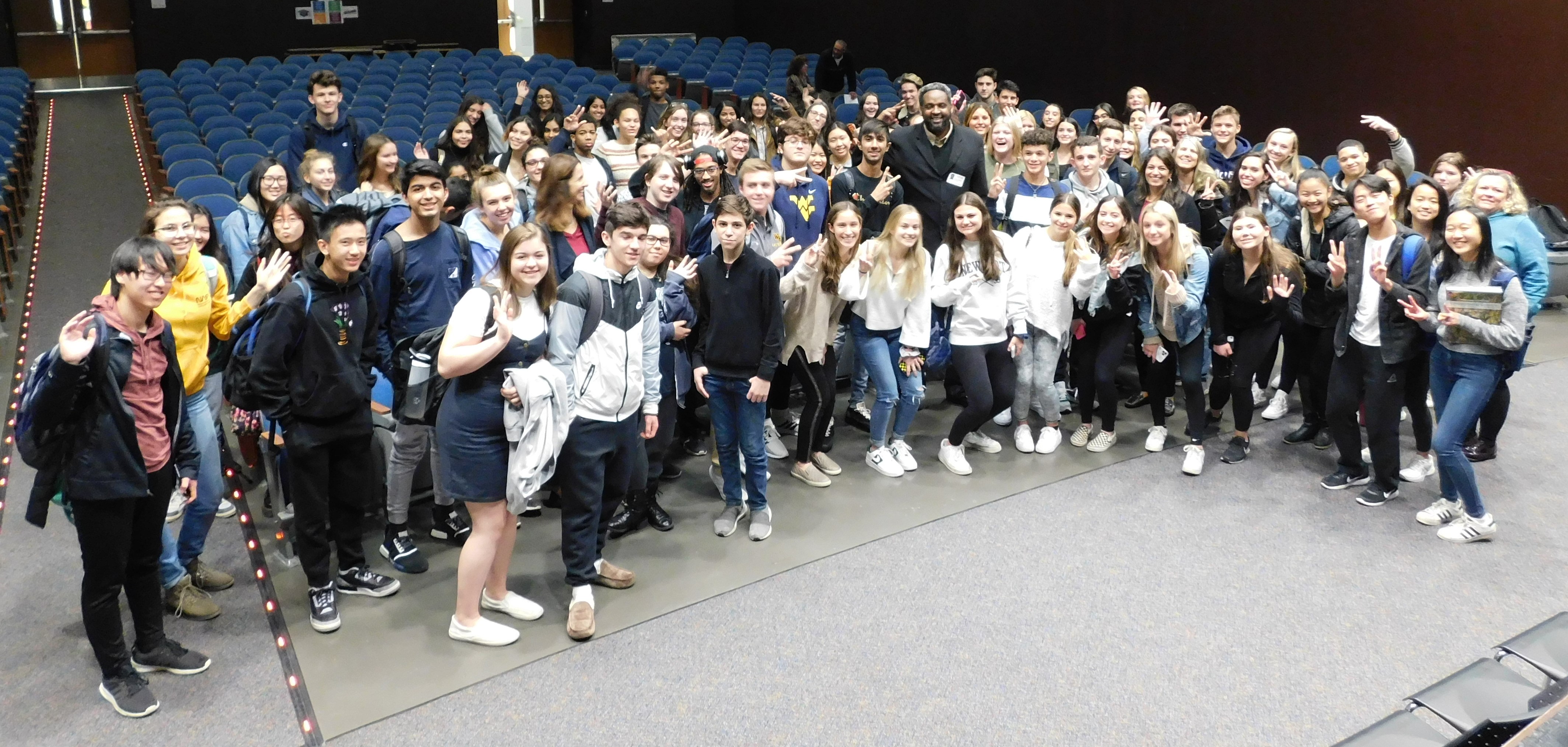
(above) WHRHS Social Studies students and WHRHS Staff welcomed Guest Speaker Kizito D. Kalima to WHRHS South Auditorium on Thursday, November 21. Kalima is a survivor of the Genocide in 1994 in Rwanda. He escaped as many as six life and death situations during the atrocities, and eventually found refuge in the United States, but then after 10 years had to come to grips with a severe case of PTSD (Post Traumatic Stress Disorder), caused by the trauma from the childhood experiences. With help, he founded the Peace Center for Forgiveness and Reconciliation. He shared his still intact, indomitable bright spirit and effervescent personality, with the WHRHS students during United Against Hate Week.
Genocide Survivor Shares his Story with WHRHS Students
Submitted by Denis Kelly
During National United Against Hate Week held in November, Watchung Hills Regional High School (WHRHS) welcomed guest speaker Kizito D. Kalima. Kalima shared with WHRHS students his story of surviving the brutal Genocide in Rwanda, Africa as a young teenager.
He spoke in the South Auditorium to a group of students from Social Studies, English and World Languages departments.
Kalima had had to flee as many as a half-dozen life and death situations in his own country on his way to eventually reaching the safety and security of the United States. He had to experience the death of his family members, relatives, neighbors and fellow countrymen, sometimes witnessing them personally. He had to see, hear, and never forget all manner of the brutality of genocide, including executions, mass graves and hearing about plans that the refuge sites — the warehouses, the orphanages, and the safe houses where he sought temporary shelter from the carnage all around him — would imminently be themselves torched, bombed, or shot up.
Even after having lived 10 years in the peace and relative safety of the United States, he realized slowly that he was, and had been, suffering from PTSD (Post-Traumatic Stress Disorder). It was complete with many of its cruel manifestations. He suffered from depression, anxiety, panic attacks, from migraine headaches, and more.
“I was being controlled still by the people who killed my family,” he shared with the WHRHS Social Studies students during his visit with them in the South Auditorium.
He needed to adopt a mindset and as a personal code, several things he never thought he would have to or could ever hope to, adopt: He needed to seek and accept help from others; and he needed to learn and to live by a belief in forgiveness and reconciliation.
Turns out, he also reclaimed his indomitable bright spirit and effervescent personality which was on full display when he interacted with the WHRHS students. It was he who suggested that a photo of him be taken surrounded by the high school students.
Kalima said he learned that the common denominator between the great advocates of forgiveness and reconciliation down through the ages, including Mahatma Gandhi (1869-1948) and Mother Teresa (1910-1997) in India, and Nelson Mandella (1918-2013) in South Africa was: They all forgave.
That was the philosophy he was able to learn about and embrace: “I decided to forgive,” Kalima said.
Kalima is the founder and executive director of the Peace Center for Forgiveness and Reconciliation, Indianapolis, Ind. Their website is chosetoforgive.org.
Kalima’s visit was part of the variety of programs as part of the WHRHS observance of National United Against Hate Week, November 17-23. The following day, the WHRHS “Warriors Against Hate March and Rally” was held, where hundreds of students, family members, faculty and administrators and members from the community, including elected officials, marched a lap around the track in the WHRHS Tozier Football Stadium. Immediately following the march, the marchers participated in a rally in the South Auditorium featuring speeches by various students. The rally also included the sharing of songs right out of the 1960s era Civil Rights Movement, and the hearing from nationally known facilitator, Guillermo Lopez Jr. Lopez, of “Us Squared,” which is an organization involved in facilitating greater awareness on social justice, equity, embracing diversity and inclusion. He was selected to help facilitate communication at the rally, at the school and in the community.
Photo by WHRHS

